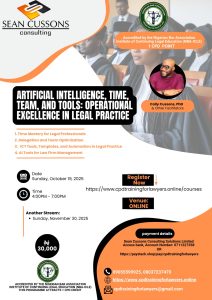FOCUS: COURT CLOSURES, ATTACKS ON JUDGES VIRTUAL HEARING FUNDING AND PROTECTION OF JUDICIAL OFFICERS. PRESENTED BY ANYIA SABASTINE . U ., 1ST VICE PRESIDENT, NBA & CHAIRMAN HUMAN RIGHTS INSTITUTE,
TODAY THE 23RD DAY OF OCTOBER, 2025 .
DEFINITION OF INDEPENDENCE
Freedom to make laws or decisions without being governed or controlled by another country, organization etc. It is the state of being free of the control of some other person, country or entity — Cambridge dictionary.
I. The Indispensable Nature of Judicial Independence
To speak of judicial independence is to speak not of judicial privilege, but of the citizen’s inalienable right to impartial adjudication. My years of experience as a lawyer taught me that a crisis, be it civil conflict, constitutional breakdown, or public health emergency, is merely a sophisticated form of pressure designed to compromise this independence. We must, therefore, stop defining independence as an absence of interference, and start defining it as the presence of robust, crisis-proof structural mechanisms.
II. The Scourge of Attacks on Judicial Officers
The deliberate targeting of judicial personnel constitutes the most venomous assault on the Rule of Law. It is a calculated mechanism of paralysis, intended to replace the authority of law with the rule of fear, thereby destroying the very basis of the social contract.
A. Physical Threats and Systemic Intimidation
Attacks, whether lethal or merely intimidating, against judges and their families are acts of political or criminal terrorism against the constitutional order. These acts compel jurists to consider personal safety over legal fidelity, critically eroding substantive independence. The state’s obligation to protect the judiciary must be absolute. Protection must be seen as an operational necessity, demanding a central, specialized Judicial Protection Unit focused on proactive threat intelligence and systemic security, not merely reactive measures.
B. Digital and Reputational Weaponization
The contemporary crisis often manifests through digital means. Coordinated disinformation campaigns, frequently originating from antagonistic political actors, seek to delegitimize judges and their rulings. This lawfare aims to erode public trust, the judiciary’s ultimate source of moral and legal authority. While judges must maintain silence on policy, the judicial institution collectively must be prepared to issue rapid, fact-based corrections to malicious narratives, defending its institutional independence without descending into partisan debate.
The Operational Imperative: Closures, Access, and the Digital Pivot
III. Court Closures and the Erosion of Access to Justice
A judicial system is defined by its ability to function, even minimally, under the worst conditions. The closure of court facilities, whether due to civil unrest or an epidemiological event, is a systemic failure to maintain constitutional functionality.
A. Mandating Minimum Viable Justice
In times of crisis, the Executive branch inevitably seeks to expand its power through emergency measures. Without functional courts, the essential check provided by judicial review vanishes. The judiciary must, therefore, mandate and maintain stringent Continuity of Operations (COOP) protocols focused on urgent matters, specifically habeas corpus, injunctions, and constitutional challenges. The constitutional guarantee of remedy demands that the court system always reserves a capacity to adjudicate matters of life, liberty, and existential threat to the Republic.
IV. The Digital Frontier: Virtual Hearings and Procedural Integrity
The rapid shift to virtual hearings (e-courts) was a necessary demonstration of resilience, but it was accompanied by profound risks to fair trial rights and procedural integrity.
A. Fairness and the Digital Divide
The efficacy of virtual hearings is undermined by the Digital Divide. When access to justice relies on bandwidth, equipment, and digital literacy, marginalized populations are systematically excluded, resulting in de facto denial of justice. Any institutional embrace of virtualization must be coupled with state-funded Digital Access Equity Centres and robust technical support, ensuring that a fair trial remains accessible to all citizens, irrespective of their economic or geographic standing.
B. Epistemology of Evidence
The integrity of the fact-finding process is diminished when proceedings are remote. The jurist’s ability to assess witness credibility based on demeanour, a foundational element of the common law tradition, is inherently compromised through a screen. Furthermore, the constitutional right to a public trial must be upheld. Virtualization must, therefore, remain a proportionate, exceptional response to crisis, applied with extreme caution to all evidentiary hearings and subject to rigorous appellate review.
Resources and Resilience: The Economic and Physical Pillars.
V. Financial Autonomy and the Funding Vulnerability
True independence is a chimera without financial security. The Executive’s control over the purse is often the most subtle and effective lever of political control.
A. The Budgetary Weapon
In fiscal crises, judicial budgets are routinely targeted by the political branches, rationalized as “non-essential” spending. A lack of operational funding directly impacts functionality: it prevents necessary security upgrades, freezes crucial technology investments, and forces judges to operate in dilapidated, unsafe environments. This dependency is a structural violation of institutional independence. The principle of the non-diminution of emoluments and conditions of service must be broadly interpreted to guarantee the full, required operational budget necessary for the court’s constitutional mandate, insulated from annual political negotiation.
B. Dedicated Crisis Funding
I propose the mandated establishment of an Emergency Judicial Reserve Fund. This fund must be structurally ring-fenced, insulated from general government appropriations, and accessible only by a supermajority resolution of the independent Judicial Council upon the declaration of a state of emergency. This reserve ensures the immediate procurement of mobile court units, emergency security details, and necessary digital infrastructure, minimizing financial subservience during periods of maximum vulnerability.
VI. Comprehensive Protection of Judicial Officers
The scope of protection for judicial officers must be comprehensive, modern, and anticipatory, reflecting the escalating and diversified threat landscape.
A. Holistic Security Doctrine
Protection cannot be limited to the courthouse. The threat is most acute at residences and during transit. Protocols must encompass:
1. Physical Hardening: Secure residences, specialized training for personnel, and secure transit logistics.
2. Digital Protection: Mandatory data privacy programs to shield personal information, secure encrypted communication platforms, and advanced training against state-sponsored digital espionage.
3. Family Safeguards: Extending proactive protection to immediate family members, recognizing them as an inevitable secondary target of intimidation. The failure to protect a judge is a failure to protect the judicial system itself, and the state bears the full moral and legal culpability for that failure.
A Mandate for Institutional Futurism: The National Call to Action
VII. The Prescriptive Framework for Crisis Resilience:
An Urgent Agenda
Drawing on decades of legal thought and observing global crises, the following five non-negotiable mandates must be immediately codified to future-proof the judiciary. This is not a set of recommendations; it is an institutional imperative.
Mandate
I. The inviolability of the judicial purse.
II. The Doctrine of Digital Equity.
III. The codification of personal security.
IV. Mandatory operational resilience (COOP).
V. Institutional counter-narrative.
Focus Area
I. Structural dependence funding.
II. The Procedural integrity (Virtual Hearings).
III. Executive accountability (protection and attacks).
IV. Operational continuity (court closures).
V. Reputational Defence (attacks).
Prescriptive Action
I. Require immediate legislative action to establish a constitutionally earmarked fund for the judiciary, guaranteeing non-diminishable appropriations indexed to national economic indicators, thereby eliminating annual political leverage.
II. Pass a comprehensive E-Justice Act enshrining the right to a digitally supported but non-prejudicial trial requiring the establishment of state-funded Digital Access Commissariats to bridge the technological divide.
III. Create by statute an Independent, Federally Mandated Judicial Security Command (JSC), autonomous from standard police command structures, dedicated solely to intelligence-led protection of judicial officers and their extended families.
IV. Implement mandatory, decentralized COOP plans, including pre-contracted facilities and establishing mobile emergency courts capable of hearing urgent matters (life and liberty) within 48 hours of a declared crisis, ensuring the Judicial Branch never shutters.
V. Fund a permanent, non-partisan Judicial Council Communications Office, empowered to monitor and issue rapid, definitive institutional rebuttals to coordinated disinformation campaigns, defending the integrity of the office from partisan attack.
CONCLUSION: The Guardian of the Social Contract
We are not here merely to document challenges; we are here to forge permanent, systemic solutions. The ultimate measure of any constitutional order is not how its courts function in times of calm, but their unshakable resolve when the constitutional foundations are imperilled. The choice before this distinguished participants is clear: Act now to codify resilience, or risk the irreversible decay of the Rule of Law. The time for consultation is over; the time for National Institutional Action is at hand.
Signed:
Sabastine Anyia, Esq.
Chairman, NBA-HRI & 1st VP, NBA
For: Nigerian Bar Association
An Urgent Agenda






